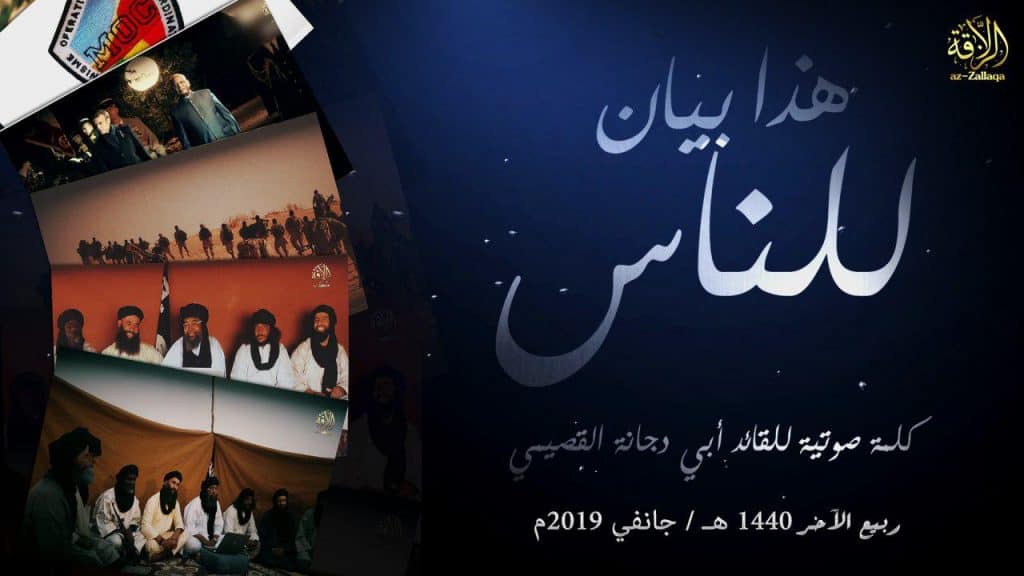
Al Qaeda’s Group for Support of Islam and Muslims (Jama’at Nusrat al-Islam wal-Muslimin, or JNIM) released a short audio message yesterday from its Saudi spokesman, Abu Dujana al-Qasimi.
Qasimi frames the conflict in northern Mali in Manichean terms, claiming that it is a “battle between truth and falsehood” and “between the carriers of the Quran and the worshippers of cross,” as well as “between the people of virtue and the followers of vice.” In Qasimi’s telling, the “mujahideen” are on the supposed side of truth, while the “Crusader enemy,” led by France, is the real source of evil.
The tribes are caught up between these opposing sides, according to Qasimi. Despite failing to achieve a “military victory on the ground” or a “political victory,” he claims, the “Crusader enemy” has taken steps to divide the tribes and prevent them from embracing the jihadists.
He warns of three plots orchestrated by the jihadists’ enemies.
First, Qasimi accuses the “Crusader enemy” of “stirring up tribalism and jahiliya [pre-Islamic ignorance] vengefulness, to preoccupy the Muslim tribes in jahiliya wars.” He claims the “Mujahideen initiated blessed steps to reconcile between the Muslim tribes,” and this resulted in “reconciliation” and the “unification of the word of the Mujahideen under one flag and one commander.”
Second, Qasimi warns people not to join the MOC (Mécanisme Opérationnel de Coordination), which combats the “Mujahideen.” He says that the jihadists “circulated awareness-raising statements warning against participating in this dirty plan” as soon as it was announced. Joining the MOC is a “clear demonstration of loyalty to the infidels,” Qasimi says.
Qasimi then attempts to justify the Jan. 2017 suicide bombing at the MOC headquarters in Gao. He says the massive bombing was only conducted after various parties, including “tribal dignitaries and their leaders,” were warned not to participate in the MOC project. Those who do join the MOC have decided to “align themselves with the Christians.”
“So we say to anyone who allows themselves to participate in this malicious project [the MOC], to show piety to Allah, who created them, and to fear Allah’s punishment and not to sell their faith for a temporary offer in the world, and to favor the everlasting to the temporary life,” Qasimi says. He reiterates his position, such that there is no confusion as to what JNIM means, claiming that entry into the MOC’s project is an act of “infidelity and apostasy from the religion of Islam.”
Qasimi reminds listeners that JNIM’s deputy emir, Abu Yahya al Hammam, blasted the MOC in a scathing speech in Oct. 2018. “You turned from warriors to negotiators and from demanding rights to participators in the violation of rights … and fight on their [France and Mali] behalf against the people of Islam under the name of ‘counter-terrorism’,” Hammam said at the time.
Hammam also stated that his message would be the “last time” JNIM warned the MOC, but Qasimi’s new recording shows that the group thought another talk directed at the MOC’s current and prospective constituents was necessary.
Third, and finally, Qasimi warns that the “occupying enemy” has put forth a new plan, which encourages the “tribes to deliver their weapons and to register them in an official fashion and to join Mali and to enter under its rule, its orders and policies, and to work militarily in its army.” This is an ultimatum, Qasimi says, that forces people to choose between “stand[ing] with the unjust” or “surrender.”
JNIM’s leaders have long tried to present themselves as the true protectors of local Muslims against France and the Malian military. While JNIM’s men have repeatedly warned tribes in the region, they have also attempted to portray themselves as their real defender. But JNIM’s leaders don’t just seek to expel all foreign forces from the region, they are also attempting to implement governance according to their own medieval version of sharia. Qasimi himself calls on local Muslims to “[c]ount” on those people “whose goal is to establish the sharia and to apply the Quran” — meaning JNIM.
Although Qasimi claims the “Crusader enemy” has failed in northern Mali, his latest talk demonstrates that JNIM is still concerned about the power of local forces aligned with the UN and France against the jihadists.
JNIM’s media arm, az-Zallaqa, has become increasingly adept at disseminating the group’s messaging. Like other recent messages, Qasimi’s talk was accompanied by both Arabic and English transcripts. Az-Zallaqa also produced a video to accompany Qasimi’s audio message. In addition to JNIM’s social media channels, the recording was also promoted by the Bayaan Foundation for Media Production, which acts like a clearing house for al Qaeda’s worldwide productions.








1 Comment
The mixed Muslim Malian tribe, the Dogon, lie at the southern most point where Jihadist Terrorists reached in 2013 after taking the northern half of Mali until the French confronted and eventually pushed them back in 2013. Other African countries have provided troops, blood, and treasure to keep them out of Mopti and further south. The Dogon have a very tolerant attitude toward religions and are culturally rich in their own animist traditions. They are looked at as pagans by the Islamists who when in control of Northern Malian cities imposed sharia in Timbuktu and destroyed numerous Sufi Muslim shrines while trying to destroy World Heritage Site Timbuktu ancient documents. The Dogon are a small tribe in the middle of the fight and have been neglected by Malian central governments and are now targetted by lingering Islamists along the Line of separation. Observers in policy positions will hopefully realize the perilous position of the Dogon.